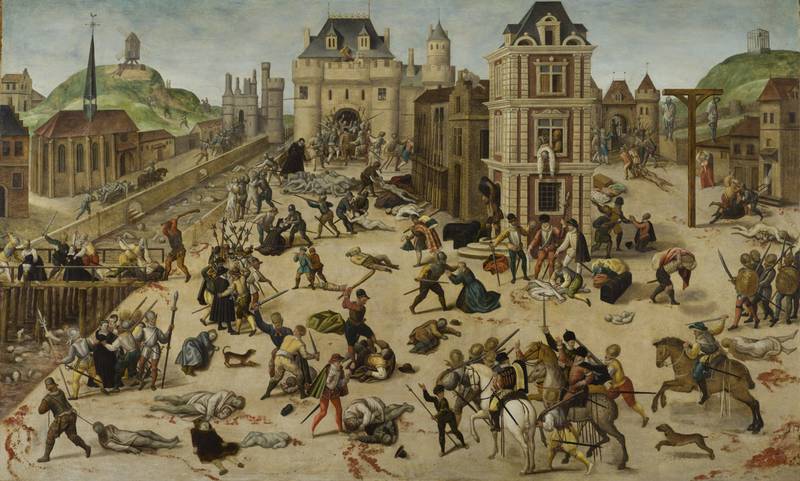
The concept of sovereignty underwent a radical transformation between the Reformation and the Peace of Westphalia. Horrific religious and civil wars forced rulers and diplomats to figure out ways in which people of different faiths could coexist. By the time more than one hundred delegations gathered in Münster and Osnabrück to establish peace (1648), the principle that the ruler gets to decide the religion of her realm (cuius regio, eius religio), which had been introduced in the Peace of Augsburg (1555), had become the basis of a new political landscape, in which borders were redrawn and religious minorities granted protections. At the same time, disputes over newly-discovered lands and open or closed seas all over the world sent statesmen and jurists on urgent quests to define borders and jurisdictions, so as to maximize the benefits to their states from discovery, trade, and fishing, while keeping their competitors and adversaries in check. The death of the childless Queen Elizabeth I and the accession of King James VI of Scotland to the throne of England set in motion the process of the union of the three kingdoms of England, Scotland, and Ireland into that of Great Britain. Once on the throne, James I of England initiated the translation of the Bible into English. At the center of all these developments lay questions about authority, boundaries, rights, and obligations, that is, questions of sovereignty. It is little wonder that this period produced two of the greatest theorists of sovereignty, Jean Bodin and Thomas Hobbes.
Between the publication of his Les six livres de la république in 1576 and the nineteenth century, Bodin’s political treatise was universally recognized as a work that transformed political science and yielded the modern definition of sovereignty. Its decline is the result of two reasons, in particular. The first is the sheer size of the work, which numbers over 800 packed pages (please see the attached sample). The second, related, reason is its curious publication history. After publishing the first edition, Bodin issued several revised French editions, until in 1586 he published a Latin version, intended for a wider audience. That edition was not simply a translation of the French into Latin. Advertised on its title page as “much richer,” the Latin edition featured many important changes, such as different examples and notes, omitted passages, and new additions, including a new chapter. Both the French and Latin circulated widely. For instance, a mere three years after the publication of the French edition, the poet Gabriel Harvey noted that it was very likely that one stepping into a scholar’s study at Cambridge would find it on the desk. Ben Jonson described his character, Sir Politic Would-be, as someone whose opinions were inspired by Machiavelli and “monsieur Bodin.” Despite the success of the French edition, in 1606, Richard Knolles who was known for having published a massive history of the Turks published an English edition entitled The Six Bookes of a Commonweale. For better or worse, Knolles worked from both the French and the Latin. Thus, his edition is unlike either of the original two on its own. It is, however, similar in size, at over 600,000 words. Knolles’s edition was the only one ever produced in English. A facsimile of it was printed in 1962 by Kenneth D. McRae, who also compiled a masterful apparatus. That edition too, however, has long been out of print.
Bodin’s influence on modern political thought is far-reaching. He was one of very few near-contemporary authors whom Hobbes cited with approval. King James VI owned the French edition and his own political writings betray Bodin’s influence. Although Locke did not cite Bodin, he had to respond to Robert Filmer, one of whose works has been described as a series of paraphrases of Bodin. Indeed, a search on Early English Books Online restricted to books published between 1576 and 1699 returns 2626 hits in 752 records for the term “Bodin” and 778 hits in 279 records for the term “Bodinus.” More broadly, Rousseau, Montesquieu, and Kant all grappled with Bodin’s theory, as did Gentili and Grotius, the two thinkers credited with having established the field of international law. The same is true of America’s founding fathers—John Adams’ copy is in the Boston Public Library. The Republica is the most important work in political thought that is currently unavailable in print.